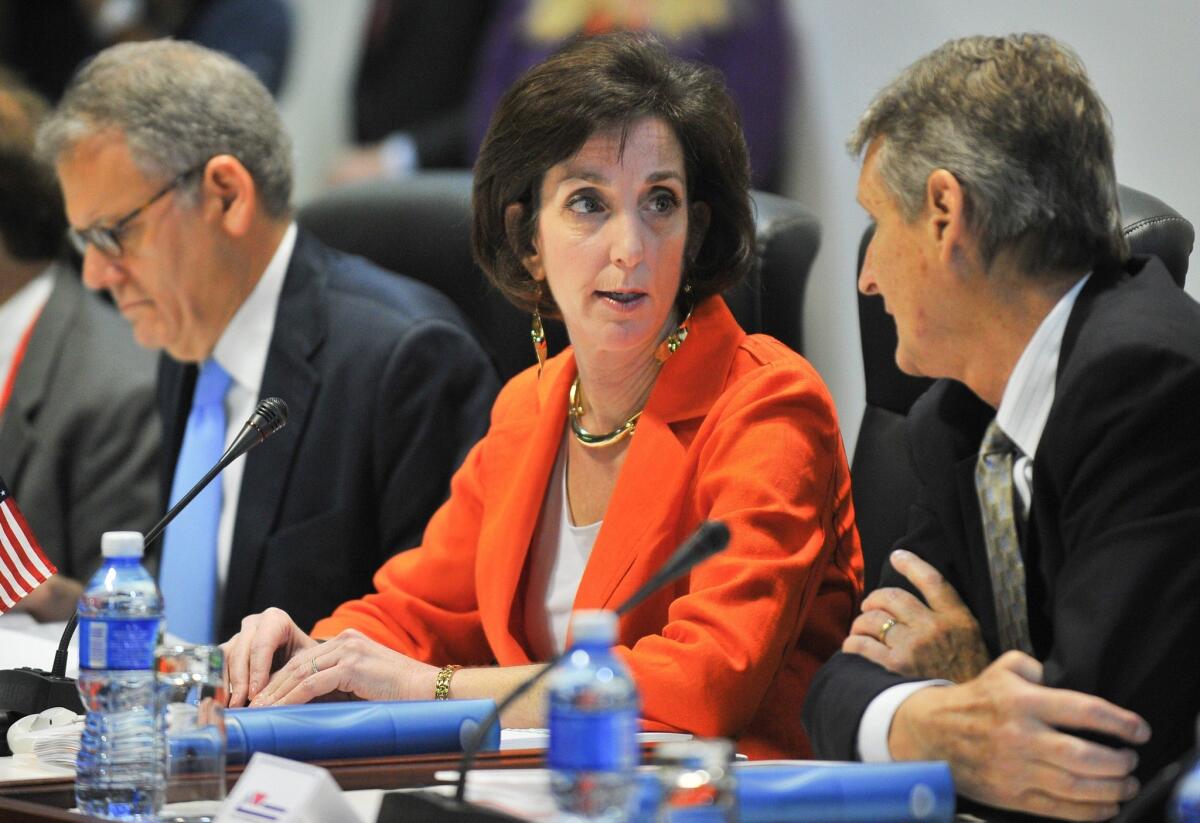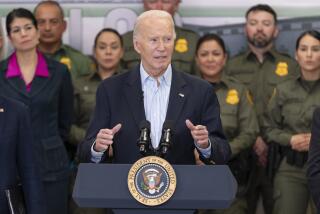Op-Ed: The post of ambassador to Mexico is vital to U.S. security and commerce. Two senators are holding it up.

Assistant Secretary of State for Western Hemisphere Affairs Roberta S. Jacobson talks with colleague Edward Alex Lee during the second day of closed-door talks between Cuba and the United States in Havana on Jan. 22.
The Paris and San Bernardino attacks are a reminder that we must control our nation’s borders, naturally including our 2,000-mile border with Mexico. Lawmakers in Washington give lip service to this imperative, but that’s about all. If they were serious about border security, they wouldn’t treat the nomination of a U.S. ambassador to Mexico like just another partisan game.
Effectively managing the U.S.-Mexico border is not simple. It’s not a question of building a wall, as some have called for, but of supervising a complex web of security, law enforcement and commercial concerns that total half a trillion dollars a year in bilateral trade. The trick is securing the border while not destroying one of the most productive economic relationships in the world.
Although Americans may assume that ambassadors are just figureheads, that’s certainly not the case for our chief of mission in Mexico City. The U.S. ambassador and her team coordinate the entire national security and commercial apparatus of our government at post in Mexico. Each of our security agencies — from the Drug Enforcement Administration to the CIA — are represented at the embassy in Mexico City. So are the departments of Agriculture, Commerce and Transportation, among others. The ambassador participates in binational joint planning and other coordinating meetings that directly affect the border. She is also plugged in to national security briefings in Washington on an almost daily basis.
It’s been six months since President Obama nominated Roberta Jacobson, the current assistant secretary of State for the Western Hemisphere, to serve in Mexico. A career civil servant — not a political appointee — with deep expertise in the region and fluency in Spanish, Jacobson is among the most highly qualified people ever tapped to represent the U.S. in Mexico.
Yet her nomination has languished, first in the Foreign Relations Committee (which finally voted, 12 to 7, to approve her nomination last month) and now on the Senate floor.
In her current role, Jacobson was a central player in the difficult negotiations that led to the normalization of diplomatic relations with Cuba. For successfully following the president’s policy directives, she has earned the ire of Sens. Marco Rubio (R-Fla.) and Ted Cruz (R-Tex.), among others, who have placed “holds” on her nomination, preventing a simple majority vote on the Senate floor.
Those who advocate building a massive wall and shutting down the border simply don’t get it...Mexico plays an extraordinarily important role in our economy.
Most senators and business groups, such as the U.S. Chamber of Commerce (hardly a fan of this administration), support Jacobson’s nomination, which makes it all the more shameful that a handful of politicians obsessed with Cuba could sabotage the nation’s (far more important) bilateral relationship with Mexico.
Delaying an up-or-down vote sends an unfortunate message to Mexicans that the U.S. neither values nor prioritizes its relationship with them — an official corollary to all the offensive, disrespectful rhetoric thrown around by Republican presidential hopefuls.
From Donald Trump’s insulting characterization of Mexicans as criminals and rapists to Ben Carson’s endorsement of vigilante-style enforcement of the border, the message heard in Mexico is clear. We could do without you. Or even: We want to do without you.
Those who advocate building a massive wall and shutting down the border simply don’t get it. Most Americans do not realize it, but Mexico plays an extraordinarily important role in our economy. It’s our second-largest export market and the top market for 23 states, including California, which sold $25.4 billion in goods to Mexico in 2014 alone.
But Mexico is far more than an export destination: It is a strategic manufacturing partner with which we make high-value products like automobiles, electronics and innovative medical devices that are sold all over the world. The integration of our economies is reflected in the stunning statistic that more than 43% of all the goods we import from Mexico contain U.S. content. This means that we are selling a lot of intermediate products and goods to Mexico en route to final production — goods made by Americans in the U.S. As Mexico grows, so does the U.S., and vice versa.
The Senate’s failure to confirm Roberta Jacobson is a wholly avoidable foreign policy blunder. The fact that two leading candidates for the presidency are to blame is simply stunning. Cruz, granted, has made his reputation thumbing his nose at the establishment; but Rubio has been touting his pragmatism and his foreign policy expertise on the campaign trail, all the while weakening our national security by allowing our vital post in Mexico City to remain vacant. He should be forced to explain himself at the next GOP debate.
Michael C. Camuñez is president and chief executive of ManattJones Global Strategies, a national consulting firm that helps U.S. companies invest and do business in Mexico. From 2010 to 2013, he was the U.S. assistant secretary of Commerce.
Follow the Opinion section on Twitter @latimesopinion and Facebook.
More to Read
A cure for the common opinion
Get thought-provoking perspectives with our weekly newsletter.
You may occasionally receive promotional content from the Los Angeles Times.






